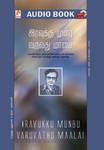
Surviving, as we barely manage (cinematically speaking, that is) with our sensitivities numbed by the mainstream movies here in this country, it is indeed with unbounded joy that one would welcome any film that breaks through the barrier of the mundane, elevates movie-watching experience to hitherto unexplored levels and, heaven forbid, makes us think. Unfortunately, Naan Kadavul does not belong in that category. Setting itself up for lofty expectations with the title and the marketing buzz and its director’s iconic status it had going for it, Naan Kadavul ends up dishing out mom’s apple pie (ok, amma’s tayir saadam). One would expect that Bala would have truly played with the gift of ambiguity that was given him by two potentially great themes in the movie – Advaita Vedanta and the Aghora philosophy (Opposites are illusory. Everything in creation is Shiva’s perfection.) – both of which are rich in interpretation and representation possibilities – but, no. Naan Kadavul draws unambiguously clear lines distinguishing the good from the evil, and for extra measure, paints the bad guy stereotype with lavish additional coats of black to ensure that thinking is not a mode the viewer even accidentally steps into. In essence, the potentially rich themes remain sadly untapped, awaiting better handling hopefully by some other, more adventurous, director in the future.
The characterization is laughable. Rudra, the protagonist (played by Arya) as an Aghora baba, looks ridiculously out of place with his corpulent physique and his Garnier coiffured, wavy locks (don’t miss the highlights!) and beard trimmed to perfection (hello! Ever heard of dreadlocks? Matted hair? Shiva?). The director seems to have him needlessly looking angry at the world all the time and speaking in some animalistic growl of a voice. Poor Arya might in fact have a good actor sulking deep in him, but Bala’s handling of him doesn’t seem to provide any exit routes for that in this film. Bala’s signature scenes of dark, musty, subterranean corridors strewn with live human bodies in varying degrees of degradation is a constant refrain and starts to get old fairly quickly (we have seen pretty much the exact same scenes starting with “Sethu” many times over now). A hodgepodge assembly of the other characters such as Rudra’s parents, Nair from Kerala, some seemingly hideous villain from somewhere else etc., don’t help the loose script much. Ditto for Pooja’s character - the blind beggar girl, Hamsavalli.
Much needed comic relief in the film is provided quite ably by one of the beggar boy characters (“ivuru periya Ambani” - “yaaru pa inda Ambani?” - “chel pone vikkara aalu – unakkellam teriyadu”) and the comic dialogues are truly funny and light and delivered with excellent timing. While the background score tends to overdo the drama bit (much like the movie itself), the tracks are fabulous – trademark Raja stuff.
So, should you go watch Naan Kadavul? My recommendation would be (notwithstanding the rant above) yes, you should – it’s not very often you see mainstream Indian cinema trying to peek outside through the keyhole. Even if, as in this case, the keyhole appears to have been closed by some errant kid’s chewed-up bubble gum, just the fact that someone’s trying to look, is reason enough to patronize. So, go and discover your inner rant.


